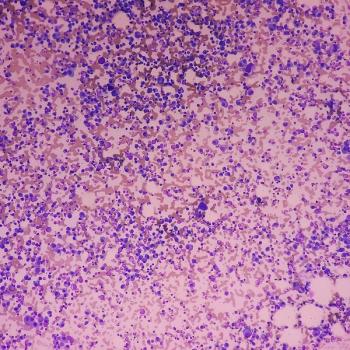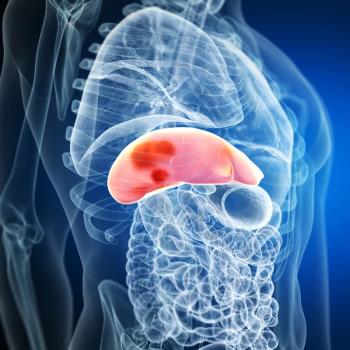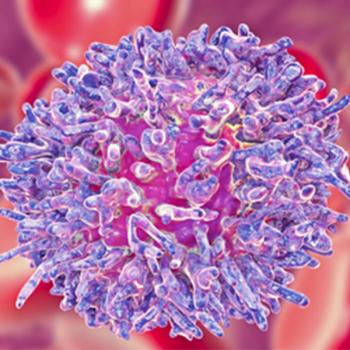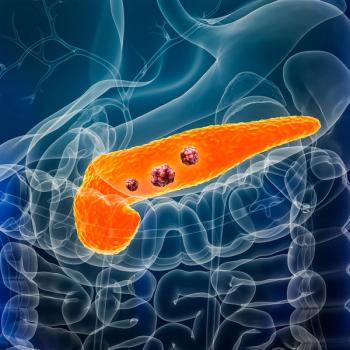
Step-up dosing with remote monitoring resulted in 47% of patients receiving bispecific antibodies remaining outpatient, even in cases of CRS.

Step-up dosing with remote monitoring resulted in 47% of patients receiving bispecific antibodies remaining outpatient, even in cases of CRS.

For patients who have progressed on endocrine therapy, consistent monitoring of blood counts and biomarker testing informs treatment sequencing.

Irpagratinib plus atezolizumab showed durable responses and manageable safety in advanced HCC with FGF19 overexpression, regardless of prior ICI exposure.

Treatment with Temferon led to prolonged survival and possible disease control in 2 patients with newly diagnosed glioblastoma multiforme.

KN026 plus KN046 produced sustained responses and showed a manageable safety profile in pretreated patients with HER2-positive advanced breast cancer.

The selective internal radiation therapy SIR-Spheres has been approved by the FDA for use in patients with unresectable hepatocellular carcinoma.

Volumetric PET biomarkers may help predict risk of toxicity from CAR T-cell therapy in patients with large B-cell lymphoma, new retrospective data suggest.

Gedatolisib-based combinations yielded encouraging responses in patients with mCRPC and HER2-positive metastatic breast cancer, early trial data show.

CAR T-cell therapy is starting to enter treatment conversations sooner with patients with multiple myeloma, according to Nick Barkemeyer, PA-C, MMS.

Sunvozertinib has received accelerated approval for use in advanced or metastatic non–small lung cancer harboring EGFR exon 20 insertion mutations.

The FDA has given accelerated approval to the BiTE, linvoseltamab, for use in the fifth line of therapy for relapsed/refractory multiple myeloma.

Oncologic therapies approved in June included indications in genitourinary, lung, hematologic, and head and neck cancers.

ALLO-316 showed significant activity and safety in patients with metastatic CD70-positive clear cell renal cell carcinoma.

Anlotinib combined with immune checkpoint inhibitors may benefit patients with extensive-stage small cell lung cancer treated with prior immunotherapy.

Planning for adverse effects early on helps patients prepare for what lies ahead, says Michelle Kirschner, MSN, RN, ACNP, APRN-BC.

Zirconium-89–labeled BMS-986279 demonstrated tumor uptake in fuc-GM1–positive lesions in patients with ES-SCLC.

Patients with metastatic CRPC who maintained PSMA expression had a median OS of 14.5 months with 177Lu-PSMA-617 retreatment.

The FDA removed REMS and reduced certain monitoring needs for liso-cel and ide-cel in B-cell malignancies.

In TP53 wild-type advanced or recurrent endometrial cancer, selinexor improved multiple time-to-event outcomes vs placebo.

Formal communication could help ease the transition of care from specialized myeloma centers to community clinic, according to Diane Moran, RN, MA, EdM.

The NCCN has added taletrectinib to its recommendations for use in all lines of treatments for non–small cell lung cancer harboring ROS1 mutations.

The frontline combination of ibrutinib with venetoclax was associated with complete response and durable remission for older patients with MCL.

Adjuvant aspirin did not reduce recurrence or improve survival in patients with CRC liver metastases, phase 3 data showed at the 2025 ASCO Meeting.

Subcutaneous daratumumab makes it easier for patients to find appointments that fit with their lifestyles and schedules, according to Gina Fries, PA-C.

Illuccix, a preparation kit for injectable Ga-68, has been approved to select patients for radioligand therapy before taxane chemotherapy.

Oncology nurses can help patients understand this novel mechanism of action and its potential as a treatment option.

Dato-DXd was granted accelerated approval for use in adults with EGFR-mutated NSCLC after EGFR-targeted therapy and platinum-based chemotherapy.

The combination of relacorilant and nab-paclitaxel improved survival in platinum-resistant ovarian cancer following a break from platinum-based chemo.

The novel MEK inhibitor atebimetinib plus chemotherapy showed early signs of survival benefit in first-line treatment of patients with pancreatic cancer.

Per ODAC and CHMP recommendations, subcutaneous daratumumab may become the first approved treatment for smoldering myeloma. Here’s what nurses should know.